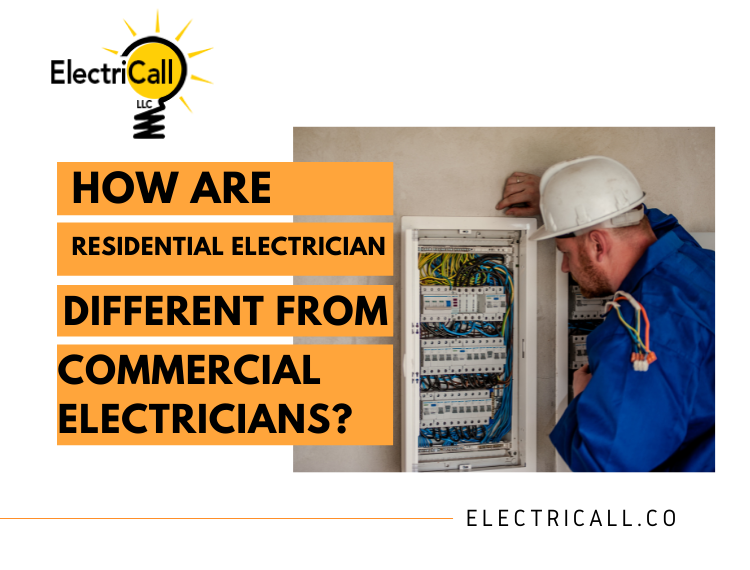
For over ten years, ElectriCall has been serving the residents and businesses of Arvada, Colorado.
Being an electrician is not an easy profession, but it is a noble one. Most of us are aware that fooling around with electricity is dangerous. Working with electricity is quite serious and potentially hazardous. Any electrician can power up a building with the right equipment. We might think that the same electrician is required in all aspects of electrical work, but that is not the case. More than 20 different types of electricians are based on their area of specialization, training, and experience. The most common among them are residential and commercial electricians. Both of them are quite complex and important in their way; still, there is a lot of overlap.
The job description of electricians may seem similar, but there are few key differences in their equipment, load demands, and energy needs.
As the name suggests, residential electricians work in residents or homes. Their tasks commonly revolve around the solutions such as service phone calls, setting up wiring, replacing panels, and setting up light fixtures. They also design lighting plans, read and interpret blueprints, and create estimates by adhering to budgets. Commercial electricians in Colorado often deal with larger-scale projects. They must have a thorough understanding of residential needs as well, as many of them also take some of the residential projects. Commercial electricians primarily work in stores, public buildings, and offices.
Let us talk about the major differences between the residential vs commercial electrician:
- General Electrical Services
The difference between residential and commercial electricians lies in the services that they offer. A lot of difference comes in the environment in which each of the electricians works. Starting with the residential electricians, they are also known as domestic electricians as they are responsible for the safety, compliance, and proper electrical installation. They have to maintain and service electrical systems to residential communities. When you call an electrician for your Denver home, the one that arrives is the residential electrician. ElectriCall is experts in the diagnosis and repair of electrical faults.
Coming on to the commercial electricians, they do almost the same duties but on a much larger scale. According to the official blueprints installed, these electricians install the wiring systems, machines, and control panels on commercial properties. Commercial electricians are mainly found in public buildings, factory complexes, commercial buildings, or any place where electricians work is required on a large scale. They also handle electrical permitting, which is often needed in major cities.
- Types of Equipment Used
The difference between commercial and residential electricians also lies in the amount of power supply they deal with. Residential electricians mainly deal with single-phase systems ranging between 120V-240V. On the other hand, commercial electricians have to deal with anything going from 120V-480V. It is because of the high power requirements of industrial loads.
Eventually, the type of equipment and supplies also differ. There is a need for various kinds of wiring, beaker, and various other electric materials. It will entirely rely on the amount of power supply in which tools are being utilized. Commercial electricians require cables having more insulation and sheathing to handle the demanding commercial applications. It includes higher voltage and current flow to perform continuously.
- Training and Technical Skills
Talking of education and training, both residential and commercial electricians start from the same level, which means that their basic qualifications are the same. But to become a commercial electrician, one has to attain a much higher skill level and gain experience. Generally, the three-phase systems require more knowledge to set up and install. It is why a commercial electrician mainly needs higher qualifications along with 4,000 hours of on-job experience.
- Worksites
The projects taken by the commercial electricians are much larger than the ones carried by residential electricians. The commercial electrical projects include working for retail organizations, public buildings, offices, and shopping centers. Many commercial electricians also make exceptions for large residential projects such as apartment buildings, massive estates. Contrary to that, the residential electricians work inside homes to complete repairs. Their work responsibilities include residential writing, electrical panel replacements, ceiling fan installation, emergency electrical services, and more.